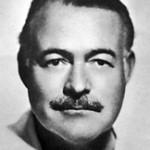Isn’t it pretty to think so? #sadendings
•••••
An excerpt from a New Yorker blog post, in which author Thomas Beller, who is not Madison Smart Bell, considers the intersection of Twitter and literature:
“Though Twitter is not exactly a new writing technology, it is a technology that is affecting a lot of writers. It used to be a radical cri de coeur to claim, ‘We live in public.’ Like many mantras of the cyber-nineties, this turns out to be mostly true, but misses an even larger truth: more and more, we think in public. For writers, this is an especially strange development.
•••
I sometimes wonder how the great writers of the past would handle the Twitter predicament. Would they ignore it or engage and go down the rabbit hole? Who are the really unlikely tweeters from literary history? Would Henry James, whose baroque sentences could never have been slimmed down into a hundred and forty characters, have disdained Twitter?
Most great writers could, if they wanted to, be very good at Twitter, because it is a medium of words and also of form. Its built-in limitation corresponds to the sense of rhythm and proportion that writers apply to each line. But some writers achieve their effect through an accumulation, or make sense via sentences that are, by themselves, on the far edge of making sense. (Robert Musil comes to mind.) Not everyone is primed to be a modern-day Heraclitus, like Alain de Botton, who starts each day, it seems, by cranking up his inner fortune-cookie machine and producing a string of tweets that are, to varying degrees, sour, funny, fatalistic, and bitingly true. It’s a comedian’s form. The primal tweet may be, ‘Take my wife, please!’
Gertrude Stein, with her gnomish, arty, aphoristic tendencies, would seem to be ideal. ‘There is no there there’ may be one of the great proto-tweets.
Joyce Carol Oates, whom I don’t think of as famously concise but who has become a prolific and often ingenious tweeter, recently tweeted a question: ‘If an action is not recorded on a smart phone, does it, did it, exist?’
Oates’s question touches on a set of major problems for writers on Twitter: Does a piece of writing that is never seen by anyone other than its author even exist? Does a thought need to be shared to exist? What happens to the stray thought that drifts into view, is pondered, and then drifts away? Perhaps you jot it down in a note before it vanishes, so that you can mull it over in the future. It’s like a seed that, when you return to it, may have grown into something visible. Or perhaps you put it in a tweet, making the note public. But does the fact that it is public diminish the chances that it will grow into something sturdy and lasting? Does articulating a thought in public freeze it in place somehow, making it not part of a thought process but rather a tiny little finished sculpture? Is tweeting the same as publishing?”
Tags: Thomas Beller

